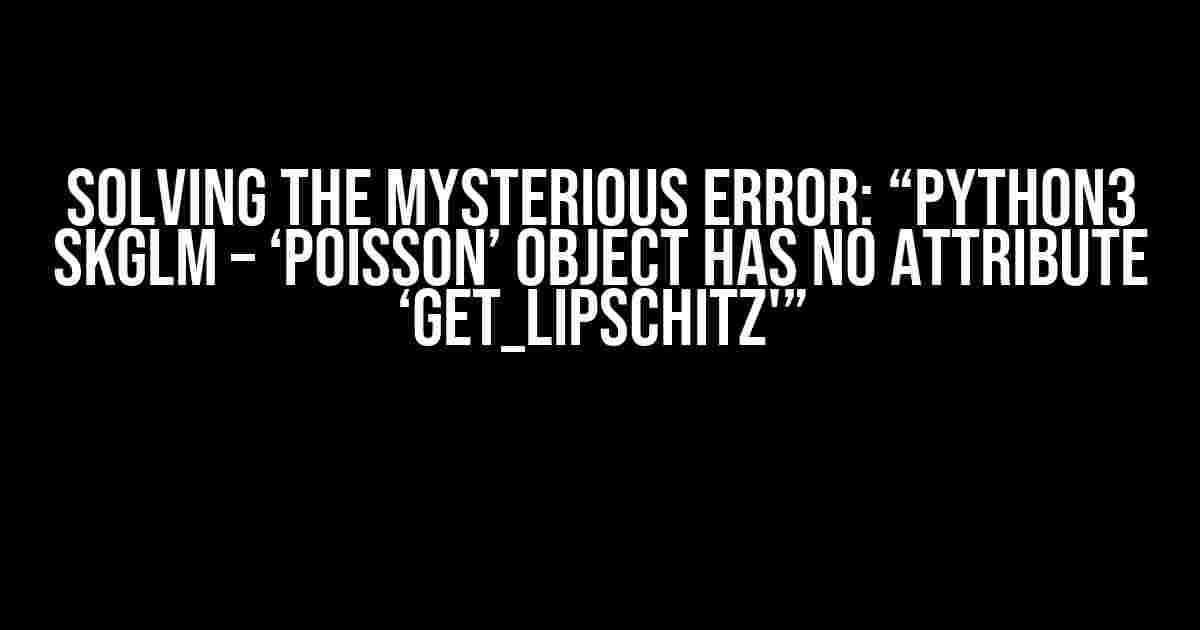Are you struggling with the frustrating error “Python3 skglm – ‘Poisson’ object has no attribute ‘get_lipschitz'” in your Python script? You’re not alone! This error can be quite perplexing, especially when you’re working with the popular skglm library for Poisson regression. Fear not, dear reader, for we’re about to unravel the mystery behind this error and provide you with a clear, step-by-step guide to fix it.
What is skglm and Poisson Regression?
Before we dive into the solution, let’s take a brief moment to understand what skglm and Poisson regression are.
skglm (Scikit-learn Generalized Linear Models) is a Python library that provides an implementation of generalized linear models, including Poisson regression. Poisson regression is a type of regression analysis used to model the relationship between a dependent variable (response variable) and one or more independent variables (predictor variables) when the response variable is a count, such as the number of defects in a manufacturing process or the number of accidents in a given region.
The Error: “Python3 skglm – ‘Poisson’ object has no attribute ‘get_lipschitz'”
Now, let’s get to the error at hand. The error message “Python3 skglm – ‘Poisson’ object has no attribute ‘get_lipschitz'” is quite cryptic, isn’t it? But don’t worry, we’ll break it down step by step.
The error occurs when you’re trying to access the ‘get_lipschitz’ attribute of a Poisson object from the skglm library. However, the Poisson object doesn’t have this attribute. But why is that?
The Root Cause: Outdated skglm Library
The main reason behind this error is that the skglm library has undergone changes, and the ‘get_lipschitz’ attribute has been removed or deprecated in recent versions. Yes, you read that right! The skglm library is constantly evolving, and sometimes, these changes can lead to compatibility issues.
Solution: Update skglm Library and Use the Correct Attributes
Now that we’ve identified the root cause, let’s move on to the solution. To fix this error, you need to update your skglm library to the latest version and use the correct attributes.
Here are the steps to update skglm:
- Open your terminal or command prompt.
- Type the following command to update skglm:
pip install --upgrade skglm - Press Enter to execute the command.
Once you’ve updated skglm, you need to use the correct attributes. Instead of ‘get_lipschitz’, you should use the ‘lipschitz_’ attribute, which is the correct attribute for accessing the Lipschitz constant in Poisson regression.
Here’s an example code snippet to illustrate this:
import skglm
# Create a Poisson regression object
poisson_reg = skglm.Poisson()
# Access the Lipschitz constant using the correct attribute
lipschitz_constant = poisson_reg.lipschitz_
print("Lipschitz constant:", lipschitz_constant)
Troubleshooting Tips and Tricks
While updating the skglm library and using the correct attributes should fix the error, sometimes, you might encounter other issues. Here are some troubleshooting tips and tricks to help you:
- Check your Python version**: Ensure that you’re running the latest version of Python. You can check your Python version using
python --versionin your terminal or command prompt. - Verify your skglm installation**: Make sure that you’ve installed skglm correctly. You can check by running
pip show skglmin your terminal or command prompt. - Consult the skglm documentation**: If you’re unsure about the correct attributes or methods, refer to the official skglm documentation, which provides detailed information on the available attributes and methods.
- Search online forums and communities**: If you’re still stuck, search online forums and communities, such as Stack Overflow or Reddit’s r/learnpython, for similar issues and solutions.
Conclusion
In conclusion, the error “Python3 skglm – ‘Poisson’ object has no attribute ‘get_lipschitz'” can be resolved by updating the skglm library and using the correct attributes. By following the steps outlined in this article, you should be able to fix this error and continue working with Poisson regression in Python.
Remember, debugging is an essential part of the programming process, and with a little patience and persistence, you can overcome even the most puzzling errors.
| Library | Attribute | Description |
|---|---|---|
| skglm | lipschitz_ | Lipschitz constant in Poisson regression |
| skglm | get_lipschitz (Deprecated) | Old attribute for accessing Lipschitz constant (removed in recent versions) |
If you have any further questions or need more assistance, don’t hesitate to ask. Happy coding!
Frequently Asked Questions
Get quick answers to common questions about the “Python3 skglm – ‘Poisson’ object has no attribute ‘get_lipschitz'” error!
What is the ‘Poisson’ object in skglm, and why is it causing an error?
The ‘Poisson’ object in skglm is an instance of the Poisson regression model, which is a type of generalized linear model. The error occurs when you try to access the ‘get_lipschitz’ attribute, which doesn’t exist for the ‘Poisson’ object.
What is the purpose of the ‘get_lipschitz’ method, and why do I need it?
The ‘get_lipschitz’ method is used to compute the Lipschitz constant of a model, which is a measure of its smoothness. You might need it for certain machine learning algorithms or regularization techniques, but it’s not essential for basic Poisson regression modeling.
How can I fix the ” ‘Poisson’ object has no attribute ‘get_lipschitz’ ” error?
You can fix the error by removing any references to the ‘get_lipschitz’ method when working with the ‘Poisson’ object. If you need to compute the Lipschitz constant, consider using a different model or algorithm that supports this method.
Are there any alternatives to the ‘Poisson’ object in skglm?
Yes, skglm provides other regression models, such as the ‘Normal’ object for normal linear regression or the ‘Binomial’ object for binary logistic regression. You can explore these alternatives depending on your specific modeling needs.
Where can I find more information about skglm and its models?
You can find detailed documentation and tutorials on the official skglm website, as well as on online platforms like GitHub and PyPI. Additionally, you can explore other resources, such as machine learning forums and blogs, for more in-depth explanations and examples.
